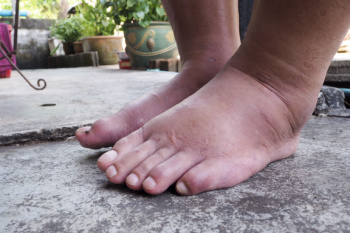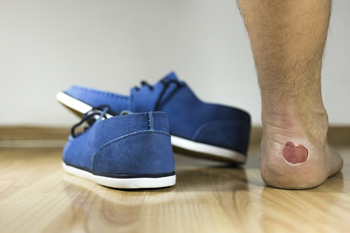Connect With Us
Blog
Heel Pain Can Be Treated!
Uncomfortable Swollen Feet and Ankles

Swollen feet and ankles can occur for various reasons, often resulting from underlying health conditions or physical changes. Pregnancy is a common cause as the body retains more fluid, and the growing uterus places pressure on veins, affecting circulation. Foot and ankle injuries, such as sprains or fractures, can also cause swelling as the body responds to trauma with inflammation. Venous insufficiency occurs when the veins are unable to efficiently return blood to the heart, leading to fluid buildup in the lower legs and feet. Additionally, phlebitis, the inflammation of veins, can also contribute to swelling and discomfort. In each of these cases, swelling is usually accompanied by pain, redness, or warmth. If you have swollen feet or ankles, it is suggested that you consult a podiatrist who can determine what the cause is, and offer effective relief tips.
Swollen feet can be a sign of an underlying condition. If you have any concerns, contact one of our podiatrists of Foot & Ankle Associates of Maine. Our doctors can provide the care you need to keep you pain-free and on your feet.
Swollen feet are a common ailment among pregnant women and people who stand or sit for extended periods. Aging may increase the possibility of swollen feet and patients who are obese often notice when their feet are swelling too. There may be medical reasons why swollen feet occur:
- Phlebitis - A condition that causes the veins to become inflamed and can also cause leg pain.
- Liver disease - This may lead to low blood levels of albumin which is a protein. This can cause fluid in the blood to pass into the tissues and several areas of the body can become swollen.
- Heart failure - When the heart doesn’t pump properly the blood that is normally pumped back to the heart can pool in the veins of the legs causing swollen feet.
- Kidney disease - One of the main functions of the kidneys is releasing excess fluid in the body. This type of condition can make it difficult for the kidneys to function properly, and as a result the feet may become swollen.
- Deep-vein thrombosis (DVT)- This is a serious condition where blood clots form in the veins of the legs. They can block the return of blood from the legs to the heart which may cause the feet to swell. It is important to be treated by a podiatrist if this condition is present.
Swollen feet can also be caused by bone and tendon conditions, including fractures, arthritis, and tendinitis. Additionally, there may be skin and toenail conditions and an infection may cause the feet to swell. Patients who take medicine to treat high blood pressure may be prone to getting swollen feet.
Many patients elevate their feet to help relieve the swelling and this is generally a temporary remedy. When a podiatrist is consulted the reason behind the swelling can be uncovered and subsequently treated.
If you have any questions please feel free to contact our office located in Brunswick, ME . We offer the newest diagnostic tools and technology to treat your foot and ankle needs.
Various Types of Foot Pain

Foot pain can stem from several conditions, each with its own symptoms and treatments. Flat feet occur when the arches of the feet collapse, leading to pain in the arch or heel, particularly after standing for long periods of time.This can cause a feeling of tired, achy feet. Clubfoot is a congenital condition where the foot is twisted inward and downward, making it difficult to walk. Treatment usually involves stretching, casting, or surgery, depending on severity. Bunions are bony bumps that form at the base of the big toe, often due to wearing tight footwear or genetic factors. They cause pain, swelling, and difficulty finding shoes that fit comfortably. A podiatrist can help by diagnosing the cause of your foot pain. Treatment options include custom orthotics, stretching exercises, pain management, or surgery, if necessary. For flat feet, a podiatrist may recommend special insoles, while bunion treatments might include surgical correction. If you are experiencing foot pain, it is suggested that you schedule an appointment with a podiatrist for relief and proper care.
Foot Pain
Foot pain can be extremely painful and debilitating. If you have a foot pain, consult with one of our podiatrists from Foot & Ankle Associates of Maine. Our doctors will assess your condition and provide you with quality foot and ankle treatment.
Causes
Foot pain is a very broad condition that could be caused by one or more ailments. The most common include:
- Bunions
- Hammertoes
- Plantar Fasciitis
- Bone Spurs
- Corns
- Tarsal Tunnel Syndrome
- Ingrown Toenails
- Arthritis (such as Gout, Rheumatoid, and Osteoarthritis)
- Flat Feet
- Injury (from stress fractures, broken toe, foot, ankle, Achilles tendon ruptures, and sprains)
- And more
Diagnosis
To figure out the cause of foot pain, podiatrists utilize several different methods. This can range from simple visual inspections and sensation tests to X-rays and MRI scans. Prior medical history, family medical history, and any recent physical traumatic events will all be taken into consideration for a proper diagnosis.
Treatment
Treatment depends upon the cause of the foot pain. Whether it is resting, staying off the foot, or having surgery; podiatrists have a number of treatment options available for foot pain.
If you have any questions, please feel free to contact our office located in Brunswick, ME . We offer the newest diagnostic and treatment technologies for all your foot care needs.
Causes and Prevention of Blisters From Running

Blisters are common injuries for runners, often caused by friction between the skin and footwear or socks. When a runner's feet move within shoes that do not fit properly or are made of materials that rub against the skin, the skin layer becomes irritated, resulting in a fluid-filled bubble. Several factors contribute to blister formation, including moisture, prolonged pressure, and wearing poorly-fitting shoes. The friction intensifies with sweat, causing the skin to become more vulnerable. In addition to uncomfortable shoes, wearing socks made from cotton rather than moisture-wicking materials can increase the risk of blisters. To prevent blisters while running, it is important to choose well-fitting shoes and wear socks that keep feet dry. Taking care to check for any areas of irritation during runs can also help in preventing painful blisters. If you have a foot blister that is bothersome or has become painful, it is suggested that you consult a podiatrist who can offer effective relief and prevention methods.
Blisters are prone to making everyday activities extremely uncomfortable. If your feet are hurting, contact one of our podiatrists of Foot & Ankle Associates of Maine. Our doctors can provide the care you need to keep you pain-free and on your feet.
Foot Blisters
Foot blisters develop as a result of constantly wearing tight or ill-fitting footwear. This happens due to the constant rubbing from the shoe, which can often lead to pain.
What Are Foot Blisters?
A foot blister is a small fluid-filled pocket that forms on the upper-most layer of the skin. Blisters are filled with clear fluid and can lead to blood drainage or pus if the area becomes infected.
How Do Blisters Form?
Blisters on the feet are often the result of constant friction of skin and material, usually by shoe rubbing. Walking in sandals, boots, or shoes that don’t fit properly for long periods of time can result in a blister. Having consistent foot moisture and humidity can easily lead to blister formation.
Prevention & Treatment
It is important to properly care for the affected area in order to prevent infection and ease the pain. Do not lance the blister and use a Band-Aid to provide pain relief. Also, be sure to keep your feet dry and wear proper fitting shoes. If you see blood or pus in a blister, seek assistance from a podiatrist.
If you have any questions, please feel free to contact our office located in Brunswick, ME . We offer the newest diagnostic and treatment technologies for all your foot care needs.

